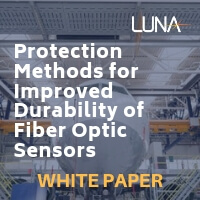
FREE WEBINAR
Monitoring Cell Temperature to Optimize Battery Performance and Design
The optimal function of Li-ion batteries is confined to restrictive temperature and voltage windows. Internal faults can initiate heating, triggering a positive feedback loop that results in thermal runaway. The worst case scenario resulting from this is an explosive hazard and potential harm to lives.
Current monitoring techniques are generally limited to battery management systems that utilize a few discrete single-point sensors, and scaling up of sensor count with higher capacity packs is typically prohibitive. Research into the detection of the onset of failure focuses largely on internal modifications to the cells themselves. However, a safer, more powerful and cost-effective solution to detect and provide warning of battery faults well in advance of failure is necessary.
Join us for this webinar to learn how dielectrically insulated fiber optic sensors can be integrated into battery packs and assemblies to monitor for rapid increases in temperature at the level of individual cells as well as to monitor for increases in strain consistent with pack swelling.
Learn about:
- High-definition fiber optic sensing (HD-FOS) technology for distributed temperature and strain measurements
- Deploying HD-FOS for cell temperature measurements
- Integrating sensors into battery packs
- Using HD-FOS analysis to optimize pack and containment design
- Early detection of cell failure using HD-FOS
Now Available On-Demand!
More about "Monitoring Cell Temperature to Optimize Battery Performance and Design" & FAQ
How much does this online training cost?
This training is 100% free!
What topics will you cover?
This webinar will teach you about monitoring cell temperature to optimize battery performance and design.
About the Presenter

Dr. Rahim joined Luna’s Applications Engineering team in August 2011. During her time at Luna, she has been heavily involved in the application and development of high definition distributed fiber optic sensing (HD-FOS) to various applications spanning automotive and aerospace industries.
Her research and applications work has included implementing HD-FOS on lithium ion batteries for temperature monitoring, in thermoplastic induction welded parts and in variety of structural testing applications. Dr. Rahim holds a B.A. and M.Eng. in Mechanical Engineering from the University of Cambridge, and a Ph.D. in Mechanical Engineering from MIT.









